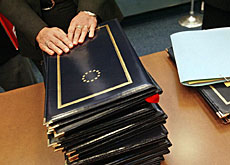diplomats – switzerland’s modern defenders

The bilateral accords between Switzerland and the European Union are testimony to the talent of the Swiss negotiators in charge of defending the nation's interests.
While Switzerland had an advantage at the negotiating table due to the country’s financial clout, its diplomats proved tenacious and flexible when it came to the crunch.
In December 1992, a thin majority of Swiss voters chose not to join the European Economic Area. Undeterred by its defeat, within a month the government began negotiating a series of bilateral agreements with Brussels.
Eleven years and five votes later, two sets of accords have led to closer ties with the EU, but have also helped maintain Switzerland’s independence.
“Switzerland essentially got what it wanted,” confirms René Schwok, a political expert at Geneva University.
While the Swiss must now align their legislation with the EU’s, there are also a number of significant exceptions. Road transport was one
of the biggest stumbling blocks.
Switzerland does not want to sees lorries weighing more than 28 tons cross the Alps. The so-called Alpine Initiative, accepted by voters in 1994, also demands the transport of goods off the road and on to the railways.
Taxing times
Given this background, the Swiss were in a difficult position to negotiate with the Europeans. After five years of talks, Bern accepted letting 40-ton trucks through the country, but gets to tax each one €200 (SFr312). The deal was chalked up by observers as a win for Switzerland, with Brussels adhering to the Swiss concept of goods transport.
Another victory for the Swiss was the (so far) successful defence of banking secrecy. To fight tax fraud, the EU wanted to force all its citizens to pay taxes on their savings, no matter where their assets were.
For the Swiss, this meant handing over sensitive data from the country’s banks, and effectively breaching banking secrecy. To avoid this, they have instead – with the EU’s backing – chosen to impose a withholding tax on interest earned.
The tax rate set at 15 per cent at the beginning will eventually rise to 35 per cent.
This is the first time Switzerland has
levied a tax on behalf of other states. But it refuses to punish tax
fraud. Hiding your money from a foreign nation remains only an administrative offence, not enough to convince the Swiss to waive banking secrecy.
But is acting this way in the best interests of Switzerland?
“Certainly, if you consider from the viewpoint of the centre-right majority in parliament,” said Schwok. “But the idea of national interests is not the same for everyone.”
Financial sector
According to Schwok, historians on the left of the political spectrum have always claimed that Swiss diplomacy was working for the economy and the financial sector.
The country’s banks built their fortune from the late 19th century onwards with capital snatched from under the noses of tax services in other nations.
But the political analyst adds that Switzerland’s success at the negotiating table has more to it than the country’s wealth, its position as the continent’s banker and its central location. For Schwok, Swiss diplomats are pretty good.
“They are very serious about their work and very tough. They know the issues inside out and how to keep a secret,” he told swissinfo.
The Swiss had an additional advantage over the EU: they were far more flexible and could react far
more quickly than Brussels’ bureaucratic machine.
“Just imagine how long it would take the EU Commission to consult each government, the parliaments and the business partners of each of its member states,” added Schwok. “By the time you talk to everyone, there has been an election in at least one of those countries.”
In Switzerland, ministers and civil servants generally stay around for a long time and are close to business. With this network, a negotiator in Brussels who has to change his approach can get the green light from his bosses very quickly.
swissinfo, Marc-André Miserez
Switzerland, which is not a member of the European Union, has managed to negotiate a series of bilateral accords, including deals on road transport and banking secrecy.
Switzerland has also granted free movement to European workers as part of the agreements, but can restrict numbers until 2014.
Its status as a non-member also allows Switzerland to negotiate trade agreements with countries outside Europe, as it already has with 20 nations.
The Swiss are also very active within the Geneva-based World Trade Organization. Switzerland heads up the G10 group of net agricultural importers, which includes Israel, Norway and Japan.
The EU is Switzerland’s main trade partner.
It is the destination for more than 60 per cent of Swiss exports, ahead of the United States.
More than 80 per cent of Swiss imports come from the EU, making Switzerland the EU’s third biggest export market behind the US and China.

In compliance with the JTI standards
More: SWI swissinfo.ch certified by the Journalism Trust Initiative

You can find an overview of ongoing debates with our journalists here . Please join us!
If you want to start a conversation about a topic raised in this article or want to report factual errors, email us at english@swissinfo.ch.